SEA CHANGE
Freediver Zandile Ndhlovu opens up the ocean to ‘black mermaids’
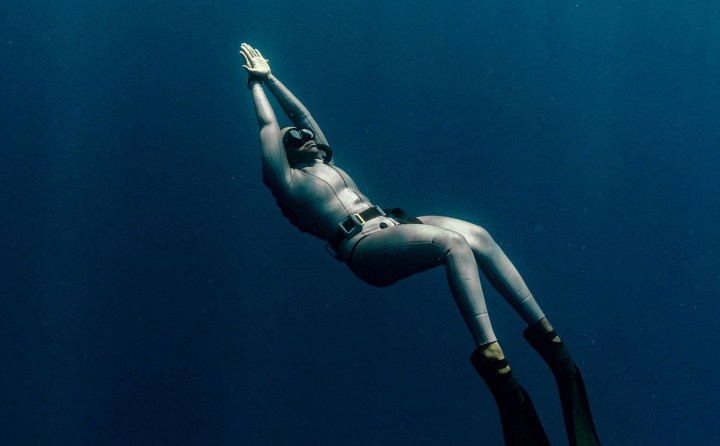
‘When we see people who look like us, we believe we can do it too.’ This is why representation in the ocean matters, says Zandile Ndhlovu.
Zandile Ndhlovu is South Africa’s first black female freediving instructor. After looking beneath the surface of the ocean for the first time in her life at 28, she felt at home and realised she needed to help make the seas more accessible and diverse.
Realising it needed to start with young people, Ndhlovu set up the Black Mermaid Foundation, which works to create diverse representation in ocean spaces, in sports, in careers and recreationally.
“In South Africa, often across black and brown communities, how we interface with the ocean is based on subsistence – our ability to provide for our homes – it’s not leisurely,” Ndhlovu told DM168 at the Plett Ocean Festival.
“I wanted to create a space where it is leisurely enough to build a connection. And that connection will be the reason that we protect the ocean.”
Ndhlovu grew up in Soweto, far from the ocean or opportunities to swim.
At a swimming lesson in Grade 6 at a multiracial school, she had her first and last near-drowning experience.
From matric, she slowly taught herself to swim at a gym. Then, while on a trip to Bali in 2016, when she was 28, Ndhlovu saw below the surface of the ocean for the first time during a snorkelling excursion.
A woman on the boat might have changed everything when she asked Ndhlovu if she had been snorkelling before.
“Had that woman not done that, I don’t think we would be here today,” Ndhlovu said during her talk on the importance of diversity in the ocean at the Plett Marine Science Symposium.
I’m a Zulu woman so deeply. I’m very traditional. But if you engage with me enough, you’ll very quickly realise that I’m very much ocean.
The woman explained how a mask would cover her nose, and how to breathe out through the snorkel. Ndhlovu recalled how she said: “You’re not going to be able to breathe through your nose, but don’t panic. This is a snorkel, hold on with your teeth, that’s how you’re going to be able to breathe while you look beneath the water.”
“This experience becomes the experience that I get to give and re-give over and over again with my kids in the foundation.”
Ndhlovu described that first dive: “After thinking I was drowning when I jumped off the boat, I looked under the surface and it was just the most beautiful world I’ve ever seen in my life.” Colourful fish swam past and the ocean floor looked lit-up beneath her. She felt at home.
Ndhlovu went on to qualify for open-water and advanced scuba diving before coming across freediving in 2019. Freediving is submerging in water for as long as possible without breathing apparatus of any kind. She can now hold her breath for just more than four minutes and can freedive to a depth of 35m.
In 2020, Ndhlovu left her corporate job in human resources to qualify as South Africa’s first black female freediving instructor, and has since spent her time working to make the ocean more diverse and accessible.
Every weekend she picks up children from Cape Town’s Langa township and drives 45 minutes to the sea for snorkel excursions, teaching the youngsters about conservation, coastal and marine pollution, how to recycle the “dirty dozen” – the 12 types of marine litter – and hosts career days.
“I hope to see more marine biologists of colour; I hope to see more people in sport.”
Read in Daily Maverick: “Khayelitsha surfer who was once ‘terrified of the ocean’ heads to Hungary for Stand Up Paddling champs”
Ndhlovu chose Langa because it’s not close to the sea and, like her hometown, is an area that came about due to segregation laws.
“Since apartheid, spatial planning has not changed in South Africa,” Ndhlovu told DM168. “And so the question of who gets access remains. I grew up in Soweto. No one came for us.”
The chance to swim
Ndhlovu continued: “We need to create the access, make sure that we’re providing the resources that help people to be able to access the ocean and learn how to swim.”

Zandile Ndhlovu teaches Plett locals how to snorkel in a lagoon. (Photo: Julia Evans)
When Louise Auersperg moved to Plettenberg Bay from Johannesburg in 2007, the first thing she noticed was a lack of diversity on beaches.
Running Plett Aquatics Swimming, Auersperg saw that 80% of youngsters couldn’t swim, mostly owing to the cost of swimming lessons.
So, in 2012, she launched non-profit Adopt A Swimmer, teaching children from Plettenberg Bay communities how to swim. More than 600 kids have had professional swimming coaching, with many going on to become lifeguards and surfers.
Auersperg told DM168 she wanted to teach children to swim, not just for safety reasons – with many going into the ocean without being able to swim – but because she has seen how swimming builds children’s confidence, helps them set goals, builds muscle tone, improves concentration and can be very therapeutic.
“There’s a certain freedom that comes with the water,” said Auersperg.
The value of representation
“Representation matters, because when we see people [who] look like us, we begin to believe that we can too,” said Ndhlovu.
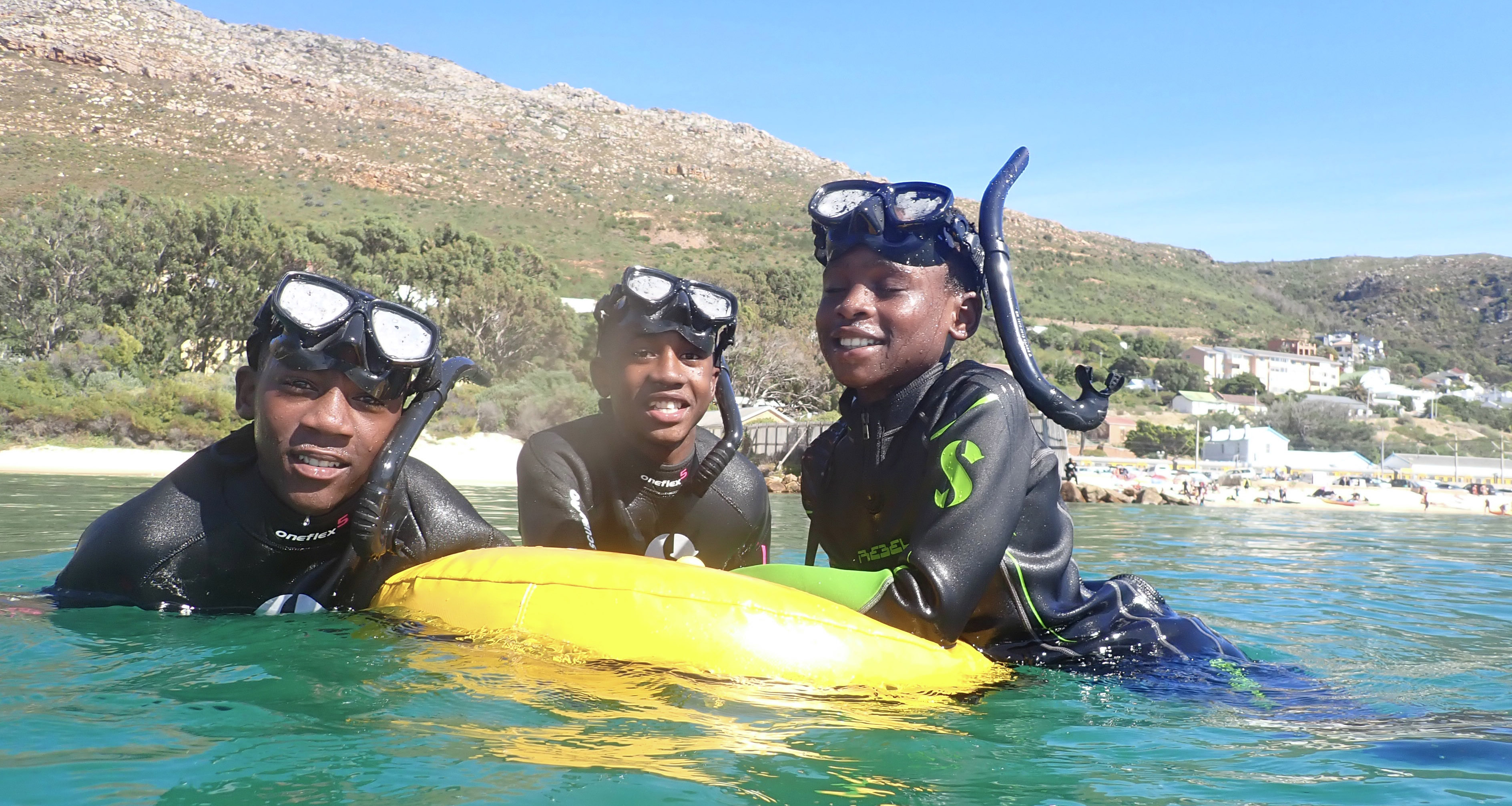
Children from Langa on a snorkelling excursion as part of the Black Mermaid Foundation’s programme. (Photo: Zandile Ndhlovu)
Ellen Kleinschmidt joined Adopt A Swimmer at the age of 10, but, unlike most people in Kranshoek, Plettenberg Bay, she knew how to swim because her father was a lifesaver and thought it important for his kids to know how to swim.
Read in Daily Maverick: “Surfing saves at-risk Durban kids from the gang and drug traps of street life”
Auersperg was her first coach and taught her water safety, breathing and currents.
“Coming from a previously disadvantaged community, I always thought swimming was only for the rich,” said Kleinschmidt.
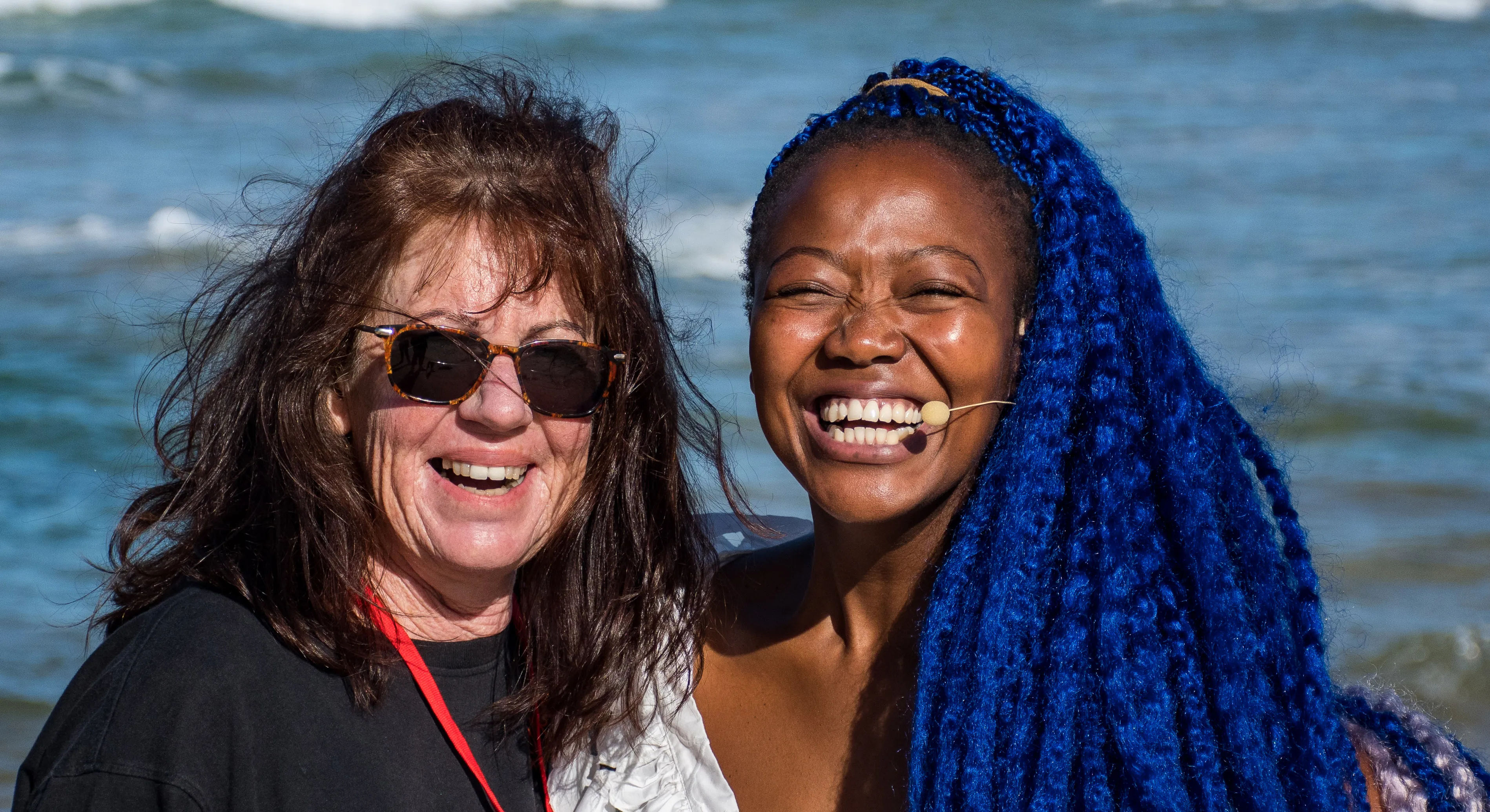
Founder of the Adopt A Swimmer programme Louise Auersperg (left) and Black Mermaid Foundation founder Zandile Ndhlovu at the Plett Ocean Festival. (Photo: Julia Evans)
One day, during one of Auersperg’s regular excursions to the local lagoon, a Nippers (young lifesavers) coach saw potential in Kleinschmidt. She started training with the group and passed the Nippers test at 12.
Kleinschmidt turned out to be a natural, going on to make the South African lifesaving team and claiming a gold medal in the African Lifesaving Championships and Conference in Egypt in February this year. She will represent South Africa at the Lifesaving World Championships 2022, to be held in Italy in September.
Kleinschmidt said having the opportunity to learn to swim changed the course of her life.
“Tannie Louise laid the foundation,” said Kleinschmidt. “Now I have the opportunity to be an example to the kids in the community that everything is possible.
“And also to go places and show the people around the world what I’m made of.”
Ndhlovu recalls becoming aware of the value of marine conservation: “When people used to say to me, ‘Save our oceans’, in 2016, I was, like, what? That’s white people’s stuff.”
Only after she started diving and experiencing life beneath the waves did it click for her.
Now, conservation is an important part of Ndhlovu’s goal of making the ocean more diverse and accessible.
But she is well aware that conservation is premised on privilege.
“We cannot care for something that we’ve never experienced, that we’ve never seen, that we feel like we have no ownership in,” said Ndhlovu.
Ndhlovu explained that this means we need to reimagine conservation to “look African”. There is no value in helicoptering in to tell people about their own environment. Also, we should not only look to the West for expert knowledge, but consider indigenous knowledge as expert too.
Changing the narrative
As a black person, Ndhlovu has always been expected to assimilate into a white culture in order to exist in the ocean space.
“I’m a Zulu woman so deeply. I’m very traditional,” she explained. “But if you engage with me enough, you’ll very quickly realise that I’m very much ocean. And I want to be everything all at once – don’t box me to be anything that feels easiest.”
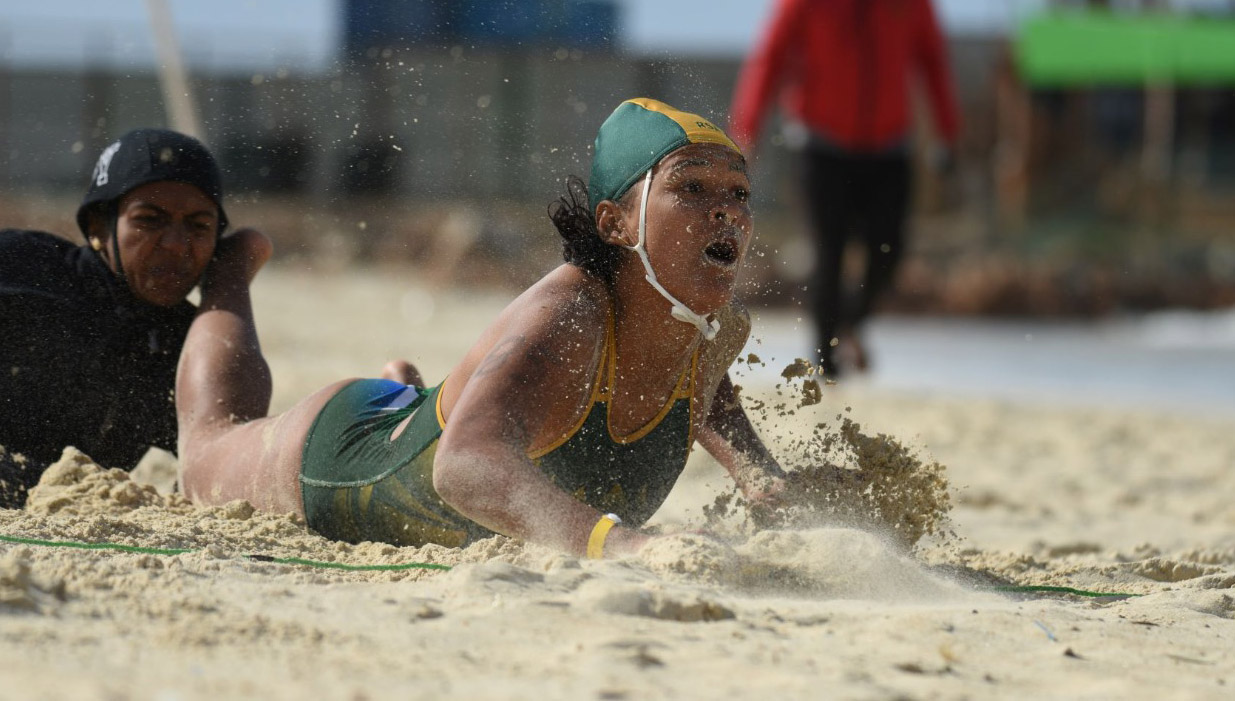
Ellen Kleinschmidt winning gold in the women’s flags event at the African Lifesaving Championships in Egypt in February 2022. (Photo: Michelle Slack / Lifesaving South Africa)
Increasing diversity in the ocean isn’t just about resources and opportunities – the accessibility also has to do with changing the narrative. “Black people can be water people too,” said Ndhlovu.
She reminded her audience at the symposium: “When you say black people don’t swim, it doesn’t end there.” She explained how this sort of comment comes from a history of oppression, of excluding black communities from beaches and dispossessing them of land.
“We have work to do in changing that narrative. So, anytime someone says to me, ‘Why do you do white people things?’ – which I get all the time – we have to remember that we need to unpack the currency of what belongs to who[m], because there’s no such thing.”
Asked how she retains so much enthusiasm and determination for the daunting challenge, Ndhlovu said she goes for a swim in the ocean, where she can clear her head and doesn’t have to be anyone but herself.
This is how she felt when she went snorkelling for the first time, in Bali. “All of a sudden, there was this world where I didn’t need to explain myself. I was just perfect as I was.” DM168
This story first appeared in our weekly Daily Maverick 168 newspaper, which is available countrywide for R25.
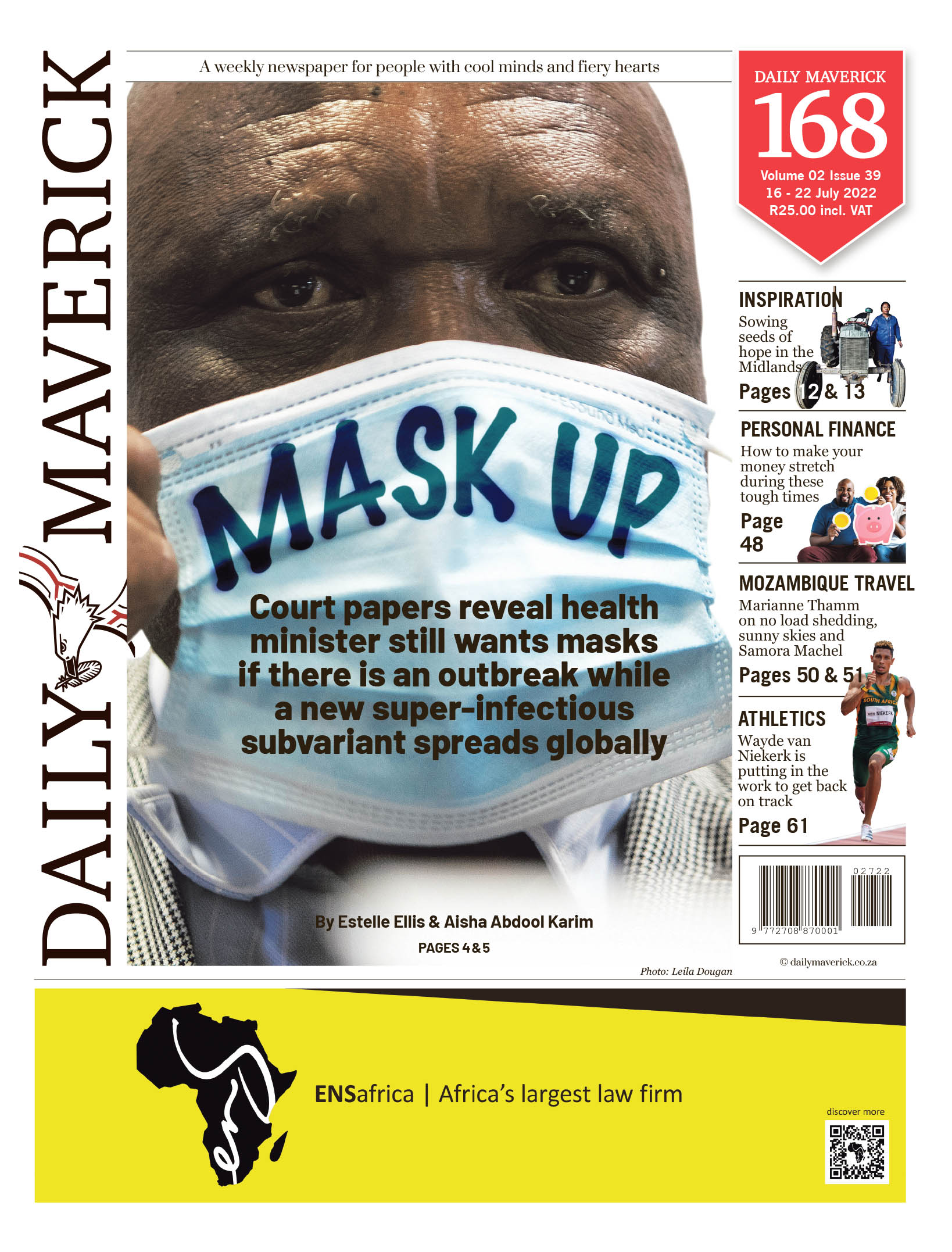











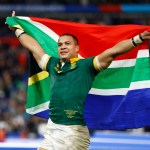









 Become an Insider
Become an Insider
At last a good news story. Well done ladies.
Love this story – also hate concepts being boxed as “white people stuff” or “black people stuff” – there is only “stuff”.